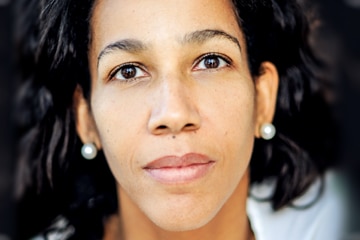On March 31 at 7pm, Jennifer Teege author of “My Grandfather Would Have Shot Me,” will be visiting the Mayerson JCC. 
But her visit marks much more than a simple author discussion. Teege’s life story is unusual – and riveting.
Adopted as a child, Teege knew that her mother was German and her father Nigerian. She kept contact infrequently, but maintained a strong relationship with her biological grandmother.
At the age of 38, an established professional, a mother, and a wife, Teege’s world was given another unexpected twist.
Teege’s grandfather was a Nazi. A commandant. Amon Goeth.
The following Q&A with Jennifer Teege is an excerpt of an interview with The Experiment Publishing.
Q: Many would say that your story is almost unbelievable, “stranger than fiction.” In your memoir you say “At age 38, I found the book. Why on earth did I pick it up off the shelf, one among hundreds of thousands of books? Is there such a thing as fate?” You also say, “I’ve realized that the book is meant for me, the key to my family history, to my life. The key I’ve been looking for all these years.” What do you make of the coincidences in your past?
Teege: It depends on how you view life: forward-thinking or backward-thinking. When I first went to Israel in my mid-twenties, I didn’t go because I was German and wanted to make amends. No, I originally went for a vacation, fell in love, and stayed. I never dreamed that there was a close tie between the country and myself. Today, I know that the stay was fateful for me.
I like to use the tree as a metaphor. Everyone has their own genealogy, with roots, a trunk, and branches. We can develop and thrive in this system, but we can’t direct it. We all exist within a larger pattern that carries and sustains us.
Q: Why was it important that you share your story? What do you hope readers will take away?
Teege: First of all, I didn’t write my story down with some specific, concrete goal in mind. But I thought that it was important to share my story in part because of a quote I read years ago, from Bettina Goering, another descendant of a perpetrator. She said that she and her brother had had themselves sterilized, so as not to produce any more Goering’s. I think that that attitude sends the wrong message. There is no Nazi gene: We can decide for ourselves who and what we want to be.
Q: Did your discovery impact how you see yourself? Did it make you feel differently about your own children?
Teege: Once I compared my life to a puzzle. There were so many pieces, but the frame was missing. I was unsure of where I fit in, and where my depression stemmed from. Today I can put the pieces into a frame, and they make up a clear picture—things aren’t in a big mess anymore. Of course there are still blindspots; everyone has them. The idea that I’m going to find all the pieces by the end of my life is unrealistic, but it’s also not important. Now I have a different way of assessing my feelings. Even if I have changed, I’ve remained the same person—I know who I am. I can live with the past now.
My children can, too. They are a whole other generation removed; for them it’s not their grandfather, it’s their great-grandfather. They are shielded, in part, by that greater distance.
Q: Following your discovery, you fell into a deep depression. Many descendants of Holocaust victims are haunted by their family’s past. Is it different for descendants of perpetrators?
Teege: Victims’ and perpetrators’ families are both bound by silence, by the desire to forget. In Germany the Holocaust is taught in detail at school but seldom discussed within the family. Many people of my generation are afraid to ask exactly what their own grandparents did during the war, how they were involved. They are afraid of the truth. In victims’ families, the dynamic is somewhat different. Most don’t want to ask because they don’t want to traumatize the survivors further, or again. One might say that they respect the silence of the survivors.
Q: Your story is a bestseller in several languages. After 70 years, why do you think there remains such a strong interest in the Holocaust? And how does your story speak to readers, beyond history?
Teege: The Holocaust was a genocide of gigantic proportions. That makes it so difficult to grasp. Why did so many people support the Nazi ideology, stay silent, look away, or participate? Why do people kick other people down? How do people turn into perpetrators? Our world is still struggling with the same themes: racism, extremism, and violence. My book doesn’t claim to have the answers; it seeks only to encourage contemplation. Along with the historical connections I’m interested in psychology—the toxic power of family secrets, depression and how to deal with it, and of course the search for one’s own identity. The book speaks to readers on all of these points in a single story.
